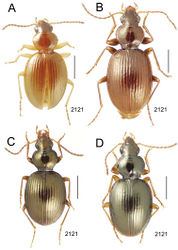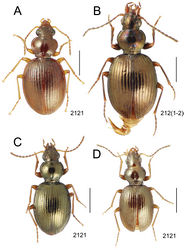Difference between revisions of "Mecyclothorax angulosus"
m (Imported from ZooKeys) |
m (1 revision) |
(No difference)
| |
Latest revision as of 09:23, 9 August 2013
| Notice: | This page is derived from the original publication listed below, whose author(s) should always be credited. Further contributors may edit and improve the content of this page and, consequently, need to be credited as well (see page history). Any assessment of factual correctness requires a careful review of the original article as well as of subsequent contributions.
If you are uncertain whether your planned contribution is correct or not, we suggest that you use the associated discussion page instead of editing the page directly. This page should be cited as follows (rationale):
Citation formats to copy and paste
BibTeX: @article{Liebherr2013ZooKeys322, RIS/ Endnote: TY - JOUR Wikipedia/ Citizendium: <ref name="Liebherr2013ZooKeys322">{{Citation See also the citation download page at the journal. |
Ordo: Coleoptera
Familia: Carabidae
Genus: Mecyclothorax
Name
Mecyclothorax angulosus Perrault, 1989: 65 – Wikispecies link – Pensoft Profile
Identification
Sharing the basally constricted, moderately transverse pronotum with the prevous two species, though the pronotum is more constricted basally in this species; MPW/BPW = 1.58–1.70 (n = 2). The eyes are much more convex in this species (Fig. 49A), ocular ratio 1.58, and the ocular lobe is nearly rightly projected from the gena; ocular lobe ratio 0.93. Also, the elytra are more narrowly rounded in beetles of this species (Fig. 49A) versus the broadly ovate, subquadrate elytra of the previous two species (Figs 48C, D). The elytral striae are also continuous with the elytral basal groove here and in Mecyclothorax spinosus, versus the basally obsolete striae observed in beetles of Mecyclothorax poro. The dorsal microsculpture is better developed here, with the head covered with a shallow but traceable transverse mesh, and the pronotal disc bearing an elongate transverse mesh, the sculpticells causing an iridescent reflection. The discal elytral intervals are covered with dense transverse lines irregularly joined into a transverse mesh. The male aedeagal median lobe has a slender shaft and a dorsoventrally expanded apex, the expansions of similar development but the dorsal one more angulate (Perrault 1989[1], fig. 7). The apical face is broadly convex, and the ostial canal is short and it approaches the dorsal margin at its terminus. Setal formula 2121; standardized body length 4.0 mm.
Distribution and habitat
Perrault (1989)[1] reported the male holotype of this species from 1900 m elevation on Mont Aorai. Subsequently a second semi-teneral female was collected in 2006 from 1320 m elevation on Aorai. It was discovered by beating dead and live fern fronds.
Taxon Treatment
- Liebherr, J; 2013: The Mecyclothorax beetles (Coleoptera, Carabidae, Moriomorphini) of Tahiti, Society Islands ZooKeys, 322: 1-170. doi
Other References
- ↑ 1.0 1.1 Perrault G (1989) La faune des Carabidae de Tahiti: IX. révision du genre Mecyclothorax (Sharp) (Psydrini) 4. le groupe de M. globosus Britton (Coleoptera). Nouvelle Revue d’Entomologie (NS) 6: 57-70.
Images
|

